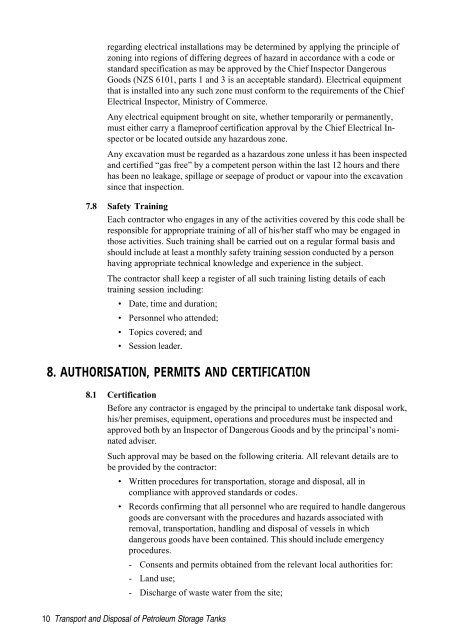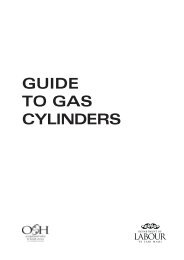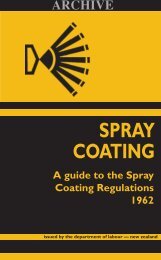Underground Petroleum Storage Tanks and Related Wastes - Code ...
Underground Petroleum Storage Tanks and Related Wastes - Code ...
Underground Petroleum Storage Tanks and Related Wastes - Code ...
Create successful ePaper yourself
Turn your PDF publications into a flip-book with our unique Google optimized e-Paper software.
egarding electrical installations may be determined by applying the principle of<br />
zoning into regions of differing degrees of hazard in accordance with a code or<br />
st<strong>and</strong>ard specification as may be approved by the Chief Inspector Dangerous<br />
Goods (NZS 6101, parts 1 <strong>and</strong> 3 is an acceptable st<strong>and</strong>ard). Electrical equipment<br />
that is installed into any such zone must conform to the requirements of the Chief<br />
Electrical Inspector, Ministry of Commerce.<br />
Any electrical equipment brought on site, whether temporarily or permanently,<br />
must either carry a flameproof certification approval by the Chief Electrical Inspector<br />
or be located outside any hazardous zone.<br />
Any excavation must be regarded as a hazardous zone unless it has been inspected<br />
<strong>and</strong> certified “gas free” by a competent person within the last 12 hours <strong>and</strong> there<br />
has been no leakage, spillage or seepage of product or vapour into the excavation<br />
since that inspection.<br />
7.8 Safety Training<br />
Each contractor who engages in any of the activities covered by this code shall be<br />
responsible for appropriate training of all of his/her staff who may be engaged in<br />
those activities. Such training shall be carried out on a regular formal basis <strong>and</strong><br />
should include at least a monthly safety training session conducted by a person<br />
having appropriate technical knowledge <strong>and</strong> experience in the subject.<br />
The contractor shall keep a register of all such training listing details of each<br />
training session including:<br />
• Date, time <strong>and</strong> duration;<br />
• Personnel who attended;<br />
• Topics covered; <strong>and</strong><br />
• Session leader.<br />
8. AUTHORISATION, PERMITS AND CERTIFICATION<br />
8.1 Certification<br />
Before any contractor is engaged by the principal to undertake tank disposal work,<br />
his/her premises, equipment, operations <strong>and</strong> procedures must be inspected <strong>and</strong><br />
approved both by an Inspector of Dangerous Goods <strong>and</strong> by the principal’s nominated<br />
adviser.<br />
Such approval may be based on the following criteria. All relevant details are to<br />
be provided by the contractor:<br />
• Written procedures for transportation, storage <strong>and</strong> disposal, all in<br />
compliance with approved st<strong>and</strong>ards or codes.<br />
• Records confirming that all personnel who are required to h<strong>and</strong>le dangerous<br />
goods are conversant with the procedures <strong>and</strong> hazards associated with<br />
removal, transportation, h<strong>and</strong>ling <strong>and</strong> disposal of vessels in which<br />
dangerous goods have been contained. This should include emergency<br />
procedures.<br />
- Consents <strong>and</strong> permits obtained from the relevant local authorities for:<br />
- L<strong>and</strong> use;<br />
- Discharge of waste water from the site;<br />
10 Transport <strong>and</strong> Disposal of <strong>Petroleum</strong> <strong>Storage</strong> <strong>Tanks</strong>





